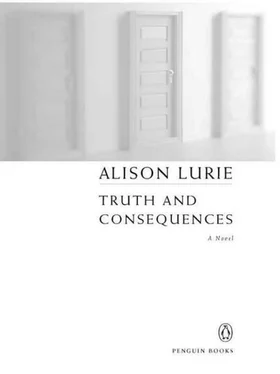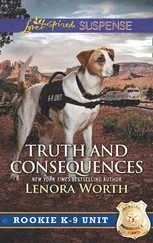“Selma might. She’s that type. And she’s always looking for some reason to talk to Delia.”
“And Delia is always looking for some reason not to talk to her.” He set down his half-finished coffee. “Come on, Janey. I’ll meet you there.”
“It’s beautiful up here,” Henry said. It was twenty minutes later, and he and Jane had just climbed the narrow, steep stairs to the Victorian cupola above the Unger Center. They had rejected all the other possible places to talk: the kitchen and dining room were still full of ladders and drop cloths and plaster dust; the main downstairs rooms were large and full of echoes, with sliding doors that hadn’t been fully closed in years. Charlie Amir was working upstairs, and he would think it strange if he saw them go into someone else’s office.
“I know Alan isn’t here,” Jane had said. “But I keep thinking he could suddenly decide to come in, and call a taxi.”
“And I keep thinking Delia could fly in the window on a broom,” Henry had remarked, surprising Jane. He never says anything negative about her, and now he’s just practically called her a witch, she thought.
“I never knew you could get up into the cupola,” he said now, looking out over the tops of the maple trees, through which a few last pale-gold leaves shone, drenched now with rain and shaken with wind.
“Most people don’t. But back in Matthew Unger’s time they used to have tea here and watch the storms coming across the lake, Lily told me.”
“Yeah, you could do that.” He glanced at the padded seats on three sides of the cupola, with their faded, flowered cushions and the little wicker table in the center. “You can see a long way,” he added. “Or I guess you could if it wasn’t for the rain and the fog.”
“Yes, for miles. But Lily Unger doesn’t like people to come up here. She says the stairs aren’t safe, and it’s too full of ghosts.”
“Ghosts?”
“Memories, I expect she meant.”
“Yeah. A place like this could have that kind of ghosts.” Without warning, he turned from the window toward Jane and kissed her lightly, instantly creating one such ghost.
“No-oh,” she whispered, and pulled away. “It isn’t—we mustn’t—”
Henry did not protest. “You’re right. We have to talk first,” he said, sitting down. “Look, the way it is. I want to be with you, and you want to be with me.”
“I never said—” Her voice trembled as she subsided onto a padded bench.
“But it’s true, isn’t it?”
Jane swallowed. It was one of her principles never to lie to a friend. “Yes, but it doesn’t make any difference,” she said hurriedly. “We can’t be together, because of Alan and Delia. We have to take care of them. We promised, we’re married.”
“Really? Are you sure?”
“What?” Jane stared at Henry and the rain-smeared glass behind him.
“Are you sure you’re married?”
“Yes, of course. What do you mean?” He’s going to talk metaphorically, philosophically, the way some professors do, Jane thought with an irritated sinking feeling. He’s never done that before.
“You never can be sure.” Henry looked at her with a strange steady expression in his dark eyes. “I thought I was married, but it turns out I was wrong.”
“You’re not married to Delia?”
“Apparently not.”
“Really? But how? Why?” Jane realized her mouth was hanging open, and shut it. “But that can’t be right,” she said. “Delia was telling everybody just last week about what a beautiful wedding you had, on a mountainside at sunset in a field of wildflowers, with a string quartet playing Schumann.”
“Yeah. We had all that: the music, the flowers, the sunset, the champagne. Everyone said how perfect it was. But it turns out Delia had neglected to get a divorce from her former husband.”
“She’d what? Good grief,” Jane, stunned, heard herself utter, in her mother’s voice, her mother’s favorite expletive. “Oh, hell,” she amended. “That’s awful.”
“I thought so. But of course when I found out, she claimed it didn’t matter. She’d forgotten all about it, she said. He was the past, and it was gone, blown away. Anyhow our souls and our bodies and our minds were truly married, so who cared about the State of North Carolina? She more or less convinced me at the time. Delia can do that, she can convince anyone of anything. Except you.” Henry gave her a brief smile.
“Wow.” Jane disregarded the compliment, if it was one. “How did you find out?”
“I saw a letter from her husband’s lawyer yesterday. He wants a divorce now, so he can marry again.”
“And will Delia agree?”
“I hadn’t thought of that. I guess so, if he pays her enough money. He’s not a bad guy—teaches at some little college in Ohio.”
“So then you could really get married,” Jane said without enthusiasm.
Henry did not reply, only shrugged.
“You wouldn’t have to have another big wedding. You could just go to the town hall right here.”
“Delia wouldn’t do that. She’d never agree to get married in an office building. Not her style at all. And what if someone found out? It would ruin her legend.”
“Really.” Jane looked at Henry. He doesn’t like her either, she thought, and felt a rush of joy. But that was wrong, and also pointless. “But if everyone thinks you’re married, you should be married,” she said. “Otherwise—”
“Otherwise we’re living in sin, and we’ve been living in sin for seven years.” Henry laughed harshly. “Is that what you mean?”
“Well, yes. At least, that’s how my mother would put it.”
“So you think I should marry a woman who’s been lying to me for seven years.”
“No—I don’t know,” Jane stuttered.
“But I don’t want to get married,” he said. “Not to Delia, anyhow. And I don’t think she wants it either. I think it’s convenient for her to be free. And always has been.”
“Convenient?” Jane said, shocked, then convinced. Well, of course Delia didn’t just forget she was already married, she thought. Nobody forgets something like that, no matter how poetic and flaky they are.
“In case she should meet someone she liked better.”
“But that’s awful—that’s—” Jane tried to find words.
“Let’s not talk about her.” Henry moved toward her. “Let’s forget about all that for a while.” He put one arm about her, then the other. “We’re here now.”
Yes, but where are we? Jane thought. On top of the Unger Center, in a place battered by wind and surrounded by rain and haunted by ghosts. Confused, she allowed Henry to move even closer. For a long moment she totally lost contact with her conscience. Then, as she felt the cold plate glass of the window against her back, she struggled upright.
“No, no, I can’t, I mustn’t,” she cried with a stifled sob. “You might be free, but I’m not.”
Henry scowled, but let her go. “Yeah, but wouldn’t you like to be free?” he asked.
“But I can’t,” Jane wailed, staring past him at the rain-smeared glass, which made her feel as if the whole room were crying. “I can’t leave Alan, not when he’s so ill. Everyone would hate me. I would hate myself.”
“What if he weren’t ill? Could you leave him then?”
“I don’t know—yes, maybe. But if he weren’t ill, if he were the person he was before, I maybe wouldn’t want to—I mean—” Jane fell silent, aware that she had said something hurtful. “Or maybe I would, I can’t tell. I don’t know anything anymore.” She swallowed another sob. “Before I met you my life was so simple, and now it’s so complicated.”
“And before I met you, my life was so complicated, and now it’s so simple,” Henry said, staring directly at her.
Читать дальше







![Кэмерон Доки - Правда и ее последствия[Truth and Consequences]](/books/79610/kemeron-doki-pravda-i-ee-posledstviya-truth-and-con-thumb.webp)




